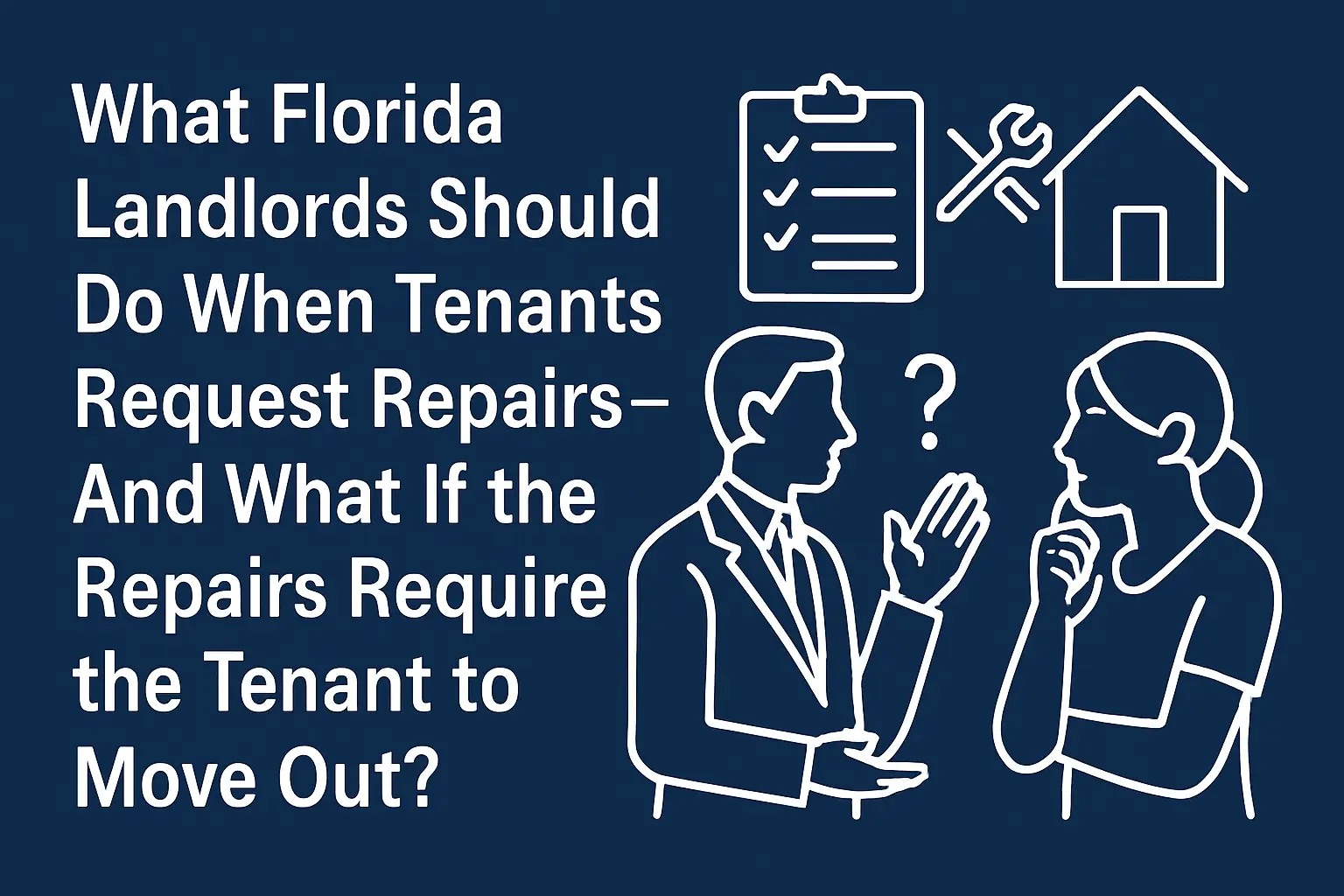Tenant maintenance and repair requests are an inevitable part of managing rental properties in Florida.
However, how a landlord responds to these requests — especially when they involve serious repairs — can determine whether the situation resolves smoothly or escalates into habitability claims, withheld rent, or lawsuits.
At Douglas Firm, we help Florida landlords manage these situations proactively and legally.
Here’s a comprehensive guide on what landlords should do when tenants request repairs — and how to handle cases where the repairs require the tenant to temporarily or permanently move out.
Step 1: Respond Promptly and Document Everything
When a tenant requests maintenance or repairs, respond quickly and in writing.
Even if you cannot address the issue immediately, acknowledging the request shows you are acting in good faith.
Best practices include:
- Responding by email, text, or letter.
- Saving a copy of the tenant’s original request.
- Confirming all conversations and repair timelines in writing.
Prompt documentation protects landlords from claims that they ignored serious issues.
Step 2: Inspect the Problem as Soon as Possible
After acknowledging the request, arrange for an inspection promptly.
You or your property manager should visit the property, or send a licensed contractor if necessary.
During inspection:
- Provide proper notice (at least 12 hours unless it’s an emergency).
- Document the problem with photos or videos.
- Take written notes or obtain contractor inspection reports.
Inspection ensures you understand the true scope of the problem — and creates evidence of your diligence.
Step 3: Prioritize Repairs That Affect Health, Safety, or Habitability
Not all repairs are legally urgent.
Under Florida Statute § 83.51, landlords must maintain certain standards related to health, safety, and habitability.
Examples of urgent issues:
- Plumbing backups or broken toilets.
- HVAC failure during hot seasons.
- Roof leaks causing water intrusion.
- Dangerous mold growth.
- Broken exterior doors, locks, or windows.
Examples of non-urgent issues:
- Cosmetic drywall cracks.
- Minor appliance malfunctions.
- Worn carpet or paint.
Key Tip:
Always prioritize repairs impacting habitability to avoid potential constructive eviction claims or rent withholding.
Step 4: Communicate the Repair Plan Clearly
Once you assess the issue, inform the tenant about the next steps:
- When the repairs are scheduled.
- How long the work should take.
- Interim accommodations if needed.
If delays occur — such as waiting for parts, permits, or contractor availability — update the tenant regularly.
Good communication is critical. Tenants often tolerate delays if they see landlords are acting responsibly.
Step 5: What If the Repairs Require the Tenant to Move Out?
In some situations, repairs render the unit uninhabitable.
Examples include major fire, water, or mold damage requiring demolition or extensive remediation.
When repairs require the tenant to move out, landlords should consider these options:
a) Offer Temporary Housing
If feasible, provide a comparable rental unit or hotel accommodations during repairs.
This is not always legally required under Florida law, but it can minimize disputes and claims.
b) Rent Abatement or Reduction
Offer a partial or full rent reduction during the period when the unit is uninhabitable.
Best practice: Document the rent adjustment in writing and clarify when full rent will resume.
c) Mutual Lease Termination
If repairs are long-term, a mutual early termination agreement may be the cleanest solution.
Include terms regarding:
- Move-out deadlines.
- Security deposit handling.
- Release of further claims.
Always get mutual termination agreements in writing.
Step 6: Document Completion of Repairs
Once the repairs are finished:
- Conduct a final inspection.
- Take updated photos/videos.
- Request the tenant’s written acknowledgment that repairs were completed satisfactorily.
Sample Tenant Acknowledgment:
“I confirm that the repairs to [property address] were completed to my satisfaction on [date].”
Keeping a complete file protects you if disputes later arise.
Step 7: What If the Tenant Refuses Access for Inspection or Repairs?
Sometimes tenants resist landlord efforts to inspect or repair the property.
Florida law (Florida Statute § 83.53) provides landlords the right to reasonable access with at least 12 hours’ noticeduring reasonable hours.
If a tenant refuses access:
1. Restate Your Request in Writing
Politely but firmly explain:
- Your right to access under the lease and Florida law.
- The necessity of the repair for health and safety.
2. Offer Flexible Scheduling (If Reasonable)
If the tenant has legitimate conflicts, offer alternative dates/times — but emphasize the urgency of needed repairs.
3. Warn About Legal Consequences
Advise the tenant in writing that:
- Refusing access violates the lease.
- Continued refusal could lead to eviction proceedings.
Florida law permits termination of tenancy for unreasonable refusal of access after proper notice.
4. Serve a 7-Day Notice to Cure or Vacate
If access is still denied:
- Serve a 7-Day Notice to Cure or Vacate.
- If the tenant still refuses, proceed with eviction based on lease violation.
Emergencies
In emergency situations (like a burst pipe), landlords may enter immediately without prior notice to protect the property and tenant safety.
Tip: When entering for inspections or repairs, always bring a licensed contractor or neutral witness to document entry and condition.
Final Tips for Florida Landlords Handling Tenant Repairs
✅ Always document everything: communications, inspections, and repairs.
✅ Prioritize habitability issues promptly to stay compliant with Florida law.
✅ Stay professional and unemotional when dealing with tenants.
✅ Hire licensed professionals for major work to protect yourself from liability.
✅ Consult an attorney if tenants obstruct repairs, make serious claims, or refuse necessary access.
Need Legal Help? Contact Douglas Firm Today
At Douglas Firm, we represent landlords across Florida in managing tenant repair disputes, property condition claims, lease enforcement, and eviction actions.
If you’re facing a difficult tenant maintenance situation — whether it’s a dispute over repairs, tenant refusal of access, or potential relocation issues — we’re here to protect your rights and your rental property.
SEE RELATED CONTENT
